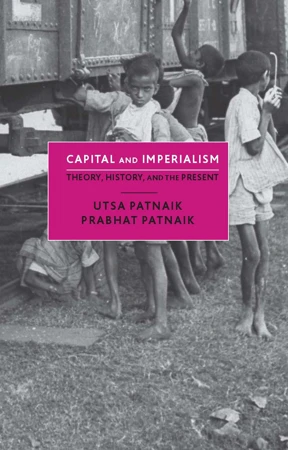Capital and Imperialism – Theory, History, and the Present

Blurb
A comprehensive survey of capitalism's colonialist roots and uncertain future Those who control the world’s commanding economic heights, buttressed by the theories of mainstream economists, presume that capitalism is a self-contained and self-generating system. Nothing could be further from the truth. In this pathbreaking book—winner of the Paul A. Baran-Paul M. Sweezy Memorial Award—radical political economists Utsa Patnaik and Prabhat Patnaik argue that the accumulation of capital has always required the taking of land, raw materials, and bodies from noncapitalist modes of production. They begin with a thorough debunking of mainstream economics. Then, looking at the history of capitalism, from the beginnings of colonialism half a millennium ago to today’s neoliberal regimes, they discover that, over the long haul, capitalism, in order to exist, must metastasize itself in the practice of imperialism and the immiseration of countless people. A few hundred years ago, write the Patnaiks, colonialism began to ensure vast, virtually free, markets for new products in burgeoning cities in the West. But even after slavery was generally abolished, millions of people in the Global South still fell prey to the continuing lethal exigencies of the marketplace. Even after the Second World War, when decolonization led to the end of the so-called “Golden Age of Capitalism,” neoliberal economies stepped in to reclaim the Global South, imposing drastic “austerity” measures on working people. But, say the Patnaiks, this neoliberal economy, which lives from bubble to bubble, is doomed to a protracted crisis. In its demise, we are beginning to see—finally—the transcendence of the capitalist system.Comment from our editors:
This volume presents a unified articulation of decades of theoretical and empirical research on imperialism and capitalist development by Marxian economists Utsa and Prabhat Patnaik. Contesting the notion of capitalist development as a self-sustained/self-contained system, they argue that the stimulus for sustained growth under capitalism relies on what economic theory considers exogenous – innovation, state, or pre-capitalist markets. They argue that capitalism is not an isolated system but co-exists with a pre-capitalist setting and operates in relation to it. And thus, imperialism continues to be the essential mechanism of capitalist accumulation. This is what makes the notion of capitalism as a self-sustained system untenable.
This volume presents a critical engagement with economic theories of capitalism and economic history from the perspective of the Global South, albeit highly dependent on the Indian experience. Mediating between the more abstract theoretical propositions from classical and heterodox schools alongside historical and current day empirical insights, they present an alternative and a highly engaging account of capitalist development. This book is a rich contribution to the role of colonialism and colonial institutions like slavery in making of the current developed world. In doing so, it also rebuts the revisionist accounts that underplay the adverse impacts of colonialism on the Global South, emphasising instead its purported benefits. Read more.
By Diversifying and Decolonizing Economics

